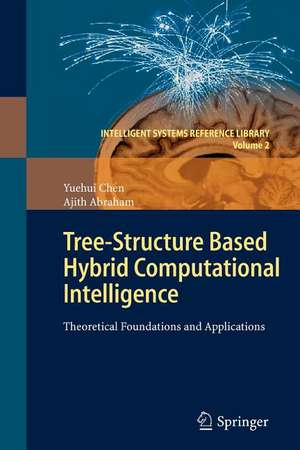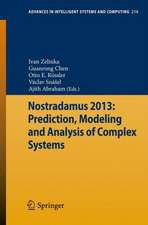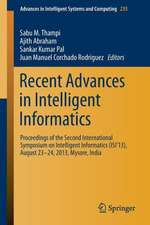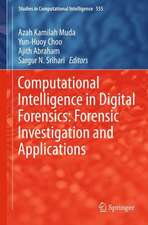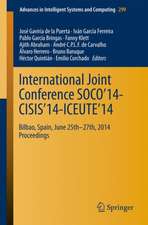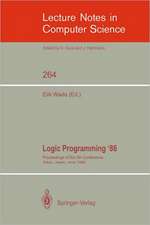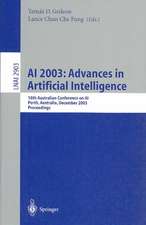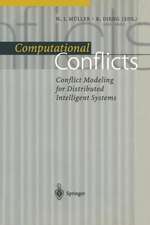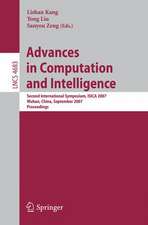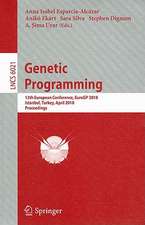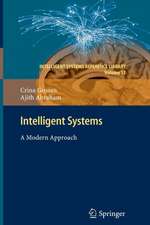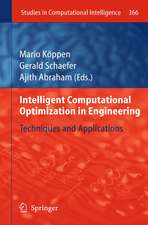Tree-Structure based Hybrid Computational Intelligence: Theoretical Foundations and Applications: Intelligent Systems Reference Library, cartea 2
Autor Yuehui Chen, Ajith Abrahamen Limba Engleză Paperback – 14 mar 2012
This volume comprises of 6 chapters including an introductory chapter giving the fundamental definitions and the last Chapter provides some important research challenges. Academics, scientists as well as engineers engaged in research, development and application of computational intelligence techniques and data mining will find the comprehensive coverage of this book invaluable.
| Toate formatele și edițiile | Preț | Express |
|---|---|---|
| Paperback (1) | 641.87 lei 6-8 săpt. | |
| Springer Berlin, Heidelberg – 14 mar 2012 | 641.87 lei 6-8 săpt. | |
| Hardback (1) | 648.11 lei 6-8 săpt. | |
| Springer Berlin, Heidelberg – 3 noi 2009 | 648.11 lei 6-8 săpt. |
Din seria Intelligent Systems Reference Library
- 20%
 Preț: 1050.57 lei
Preț: 1050.57 lei - 20%
 Preț: 1157.60 lei
Preț: 1157.60 lei - 20%
 Preț: 648.44 lei
Preț: 648.44 lei - 20%
 Preț: 650.08 lei
Preț: 650.08 lei - 20%
 Preț: 1005.64 lei
Preț: 1005.64 lei - 5%
 Preț: 968.88 lei
Preț: 968.88 lei - 20%
 Preț: 1052.67 lei
Preț: 1052.67 lei - 20%
 Preț: 1171.46 lei
Preț: 1171.46 lei - 20%
 Preț: 1164.84 lei
Preț: 1164.84 lei - 20%
 Preț: 815.83 lei
Preț: 815.83 lei - 20%
 Preț: 989.96 lei
Preț: 989.96 lei - 20%
 Preț: 1063.41 lei
Preț: 1063.41 lei - 20%
 Preț: 925.45 lei
Preț: 925.45 lei - 20%
 Preț: 504.37 lei
Preț: 504.37 lei - 18%
 Preț: 1113.26 lei
Preț: 1113.26 lei - 20%
 Preț: 1920.04 lei
Preț: 1920.04 lei - 20%
 Preț: 990.62 lei
Preț: 990.62 lei - 20%
 Preț: 651.57 lei
Preț: 651.57 lei - 20%
 Preț: 645.97 lei
Preț: 645.97 lei - 20%
 Preț: 660.16 lei
Preț: 660.16 lei - 20%
 Preț: 647.13 lei
Preț: 647.13 lei - 20%
 Preț: 654.05 lei
Preț: 654.05 lei - 20%
 Preț: 649.93 lei
Preț: 649.93 lei - 20%
 Preț: 648.11 lei
Preț: 648.11 lei - 20%
 Preț: 657.99 lei
Preț: 657.99 lei - 20%
 Preț: 656.84 lei
Preț: 656.84 lei - 20%
 Preț: 1624.04 lei
Preț: 1624.04 lei - 20%
 Preț: 642.98 lei
Preț: 642.98 lei - 20%
 Preț: 649.60 lei
Preț: 649.60 lei - 20%
 Preț: 651.23 lei
Preț: 651.23 lei - 20%
 Preț: 653.06 lei
Preț: 653.06 lei - 20%
 Preț: 1002.99 lei
Preț: 1002.99 lei - 20%
 Preț: 645.14 lei
Preț: 645.14 lei - 20%
 Preț: 658.33 lei
Preț: 658.33 lei - 20%
 Preț: 644.98 lei
Preț: 644.98 lei - 20%
 Preț: 646.62 lei
Preț: 646.62 lei
Preț: 641.87 lei
Preț vechi: 802.33 lei
-20% Nou
Puncte Express: 963
Preț estimativ în valută:
122.82€ • 128.23$ • 101.65£
122.82€ • 128.23$ • 101.65£
Carte tipărită la comandă
Livrare economică 05-19 aprilie
Preluare comenzi: 021 569.72.76
Specificații
ISBN-13: 9783642261206
ISBN-10: 3642261205
Pagini: 220
Ilustrații: XIV, 206 p.
Dimensiuni: 155 x 235 x 12 mm
Greutate: 0.32 kg
Ediția:2010
Editura: Springer Berlin, Heidelberg
Colecția Springer
Seria Intelligent Systems Reference Library
Locul publicării:Berlin, Heidelberg, Germany
ISBN-10: 3642261205
Pagini: 220
Ilustrații: XIV, 206 p.
Dimensiuni: 155 x 235 x 12 mm
Greutate: 0.32 kg
Ediția:2010
Editura: Springer Berlin, Heidelberg
Colecția Springer
Seria Intelligent Systems Reference Library
Locul publicării:Berlin, Heidelberg, Germany
Public țintă
ResearchCuprins
Foundations of Computational Intelligence.- Foundations of Computational Intelligence.- Flexible Neural Trees.- Flexible Neural Tree: Foundations and Applications.- Hierarchical Neural Networks.- Hierarchical Neural Networks.- Hierarchical Fuzzy Systems.- Hierarchical Fuzzy Systems.- Reverse Engineering of Dynamical Systems.- Reverse Engineering of Dynamic Systems.- Conclusions and Future Research.- Concluding Remarks and Further Research.
Recenzii
From the reviews:
“The book puts forward a hierarchical hybrid computational intelligence framework, in which models of a hierarchical structure and appropriate types of function operators are created and optimized by means of computational intelligence techniques. … The book is both informative and stimulating and thus becomes an interesting and valuable source.” (Ruxandra Stoean, Zentralblatt MATH, Vol. 1195, 2010)
“The book puts forward a hierarchical hybrid computational intelligence framework, in which models of a hierarchical structure and appropriate types of function operators are created and optimized by means of computational intelligence techniques. … The book is both informative and stimulating and thus becomes an interesting and valuable source.” (Ruxandra Stoean, Zentralblatt MATH, Vol. 1195, 2010)
Textul de pe ultima copertă
Research in computational intelligence is directed toward building thinking machines and improving our understanding of intelligence. As evident, the ultimate achievement in this field would be to mimic or exceed human cognitive capabilities including reasoning, recognition, creativity, emotions, understanding, learning and so on. In this book, the authors illustrate an hybrid computational intelligence framework and it applications for various problem solving tasks. Based on tree-structure based encoding and the specific function operators, the models can be flexibly constructed and evolved by using simple computational intelligence techniques. The main idea behind this model is the flexible neural tree, which is very adaptive, accurate and efficient. Based on the pre-defined instruction/operator sets, a flexible neural tree model can be created and evolved.
This volume comprises of 6 chapters including an introductory chapter giving the fundamental definitions and the last Chapter provides some important research challenges. Academics, scientists as well as engineers engaged in research, development and application of computational intelligence techniques and data mining will find the comprehensive coverage of this book invaluable.
This volume comprises of 6 chapters including an introductory chapter giving the fundamental definitions and the last Chapter provides some important research challenges. Academics, scientists as well as engineers engaged in research, development and application of computational intelligence techniques and data mining will find the comprehensive coverage of this book invaluable.
Caracteristici
Covering the new field of Flexible Neural Trees Networks in a well structured way The state of the art of Flexible Neural Trees networks for researchers and graduate students
